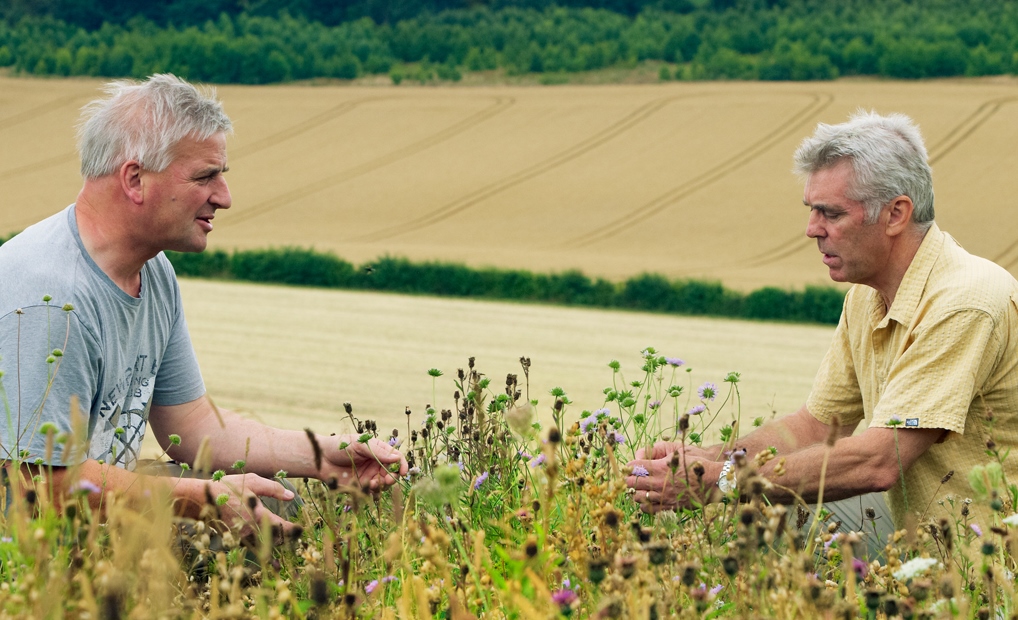Use your loaf to save British wildlife
Release Date 18 November 2015

Farmers can maintain high yields and boost nature by signing up to a wildlife-friendly scheme, new research has found.
A team of researchers, led by the Centre for Agri-Environmental Research (CAER) at the University of Reading, found that farms signed up to Conservation Grade's ‘Fair to Nature' farming scheme supported 20% more species of butterflies , while still producing the same amount of crops as conventional farms.
Growers using organic methods had higher levels of biodiversity than conventional farms - but wheat yields were significantly lower.
Farmers who sign up to the non-organic Fair to Nature growing protocol gain a premium price for their crops, in return for setting aside and actively managing at least 10% of their land as wildlife habitat. This must include at least 4% of farmland managed as pollen and nectar-rich habitat for insects and 2% for growing food for wild birds.
The Fair to Nature scheme offers a way for consumers to shop for more nature-friendly products, without having to buy fully organic goods.
Chloe Hardman, the University of Reading ecologist who led the research, said: "Farmers have a difficult but vital job to do. They are being asked to conserve wildlife while also feeding a rapidly growing global population.
"Organic farming can be great for wildlife, but if British farming abandoned conventional methods and went organic, levels of food production would fall and national self-sufficiency would plummet. Our research suggests that looking after wildlife and feeding the world are not incompatible goals."
Range of habitats
Key to supporting biodiversity was making a range of habitats available, which can be achieved by restoring hedgerows and field margins, and planting different margins with a range of seed mixes to provide food and habitat for wildlife. Areas with a greater variety of habitats supported more species of butterflies, plants, solitary bees and birds in winter. Fair to Nature and organic farms had a greater variety of habitats compared to conventional farms.
Findings suggest that previous government schemes designed to encourage farmers to help wildlife, such as ‘Entry Level Stewardship', have had limited effectiveness. The results of this study support the need for more targeted government schemes and for consumers to support farmers and brands that are wildlife- friendly.
'Providing a wider variety of habitats on the farm is very important' -- lead researcher Chloe Hardman
"It's been too easy in the past for some farmers to receive payments for very little change in habitat management," Chloe said.
"Our study shows that providing a wider variety of habitats on the farm is very important. This makes it more likely that for any one species its foraging, nesting and shelter requirements will be met.
"Like Fair to Nature, the new government-supported Countryside Stewardship scheme encourages farmers to select a combination of targeted habitat management options. Our results suggest that this will be more effective for supporting wildlife."
‘Win-win for productivity and wildlife'
Professor Simon Potts from the University of Reading who co-authored the research said: "Conservation Grade is an innovative way for farmers to boost wildlife while still maintaining high levels of production.
"Organic farming can be very good for supporting wildlife, but organic farmers are restricted in their use of conventional fertilisers and pesticides, so more land is needed to grow the same amount of food. The Fair to Nature approach shows that it may be possible to achieve a win-win for productivity and wildlife, through smart farm management practices underpinned by strong science."
'It may be possible to achieve a win-win for productivity and wildlife, through smart farm management practices underpinned by strong science' -- Prof Simon Potts
Simon Tonkin of the RSPB has been working with Conservation Grade to help expand the Fair to Nature farming system. He said: "The RSPB is a great supporter of Fair to Nature farming and has already adopted its use across our bird food range because of its great benefits to wildlife. By seeking out and supporting Fair to Nature brands and products, consumers can reward farmers who are doing the right thing and really help to reverse the dramatic decline of wildlife in the countryside."
Brin Hughes of Conservation Grade added: "We're really proud of our farmers and brands and this research underlines the biodiversity benefits of the Fair to Nature farming system. If enough of us choose to buy Fair to Nature products, like Allinson bread, Steve's Leaves salads, and the RSPB's bird food, together we can bring about a nature-friendly farming revolution, growing high quality ingredients without costing the earth."
The new research, funded by Conservation Grade and the Biotechnology and Biological Sciences Research Council (BBSRC) and conducted at the University of Reading and the University of Southampton, is published today (18 November) in the Journal of Applied Ecology.
